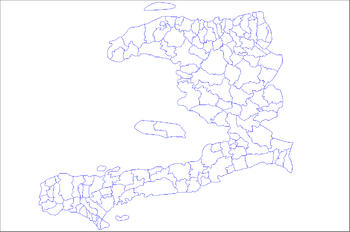Saut-d'Eau
| Saut-d'Eau Sodo | |
|---|---|
| Commune | |
|
Saut-d'Eau Waterfall | |
 Saut-d'Eau Location in Haiti | |
| Coordinates: 18°49′0″N 72°12′0″W / 18.81667°N 72.20000°WCoordinates: 18°49′0″N 72°12′0″W / 18.81667°N 72.20000°W | |
| Country |
|
| Department | Centre |
| Arrondissement | Mirebalais |
| Elevation | 233 m (764 ft) |
| Population (7 August 2003)[1] | |
| • Total | 34,885 |
Saut-d'Eau (Haitian Creole: Sodo) is a commune in the Mirebalais Arrondissement, in the Centre Department of Haiti. It has 34,885 inhabitants.
Its name is French for 'waterfall', named after a large waterfall called 'Le Saut'. The area holds cultural significance in Haiti, to both Catholic and Vodou practitioners. In the 19th century, it is believed that the Virgin Mary of Mount Carmel (or the closely associated Vodou Lwa, Erzulie Dantor) appeared on a palm tree there. A French priest, afraid of the superstition this would inspire, cut the tree down, but it nonetheless became an important religious destination for Haitians, akin to the Virgin of Guadalupe in Mexico.
Annually, the falls are the site of a large, important religious pilgrimage, during the festival of Our Lady of Carmel, from July 14–16. A Eucharistic rite is held during the festival, as well as various vodou rituals, but the penultimate devotional activity is bathing in the waters of the falls, and asking favors of the Virgin or Erzulie. The water is also sacred to the lwa Damballah and Ayida Wedo, the book The Serpent and the Rainbow is named for their appearance at this site.
References
- ↑ Institut Haïtien de Statistique et d'Informatique (IHSI)
